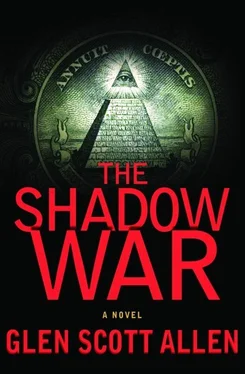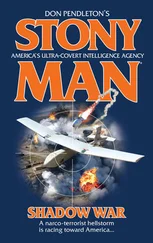Glen Allen - The shadow war
Здесь есть возможность читать онлайн «Glen Allen - The shadow war» весь текст электронной книги совершенно бесплатно (целиком полную версию без сокращений). В некоторых случаях можно слушать аудио, скачать через торрент в формате fb2 и присутствует краткое содержание. Жанр: Триллер, на английском языке. Описание произведения, (предисловие) а так же отзывы посетителей доступны на портале библиотеки ЛибКат.
- Название:The shadow war
- Автор:
- Жанр:
- Год:неизвестен
- ISBN:нет данных
- Рейтинг книги:5 / 5. Голосов: 1
-
Избранное:Добавить в избранное
- Отзывы:
-
Ваша оценка:
- 100
- 1
- 2
- 3
- 4
- 5
The shadow war: краткое содержание, описание и аннотация
Предлагаем к чтению аннотацию, описание, краткое содержание или предисловие (зависит от того, что написал сам автор книги «The shadow war»). Если вы не нашли необходимую информацию о книге — напишите в комментариях, мы постараемся отыскать её.
The shadow war — читать онлайн бесплатно полную книгу (весь текст) целиком
Ниже представлен текст книги, разбитый по страницам. Система сохранения места последней прочитанной страницы, позволяет с удобством читать онлайн бесплатно книгу «The shadow war», без необходимости каждый раз заново искать на чём Вы остановились. Поставьте закладку, и сможете в любой момент перейти на страницу, на которой закончили чтение.
Интервал:
Закладка:
"I haven't had time to really study it yet."
"Oh, you should," enthused Stoltz. "Some of the scenes date back to the 1600s, back to when this whole area was part of the Quincy Homestead, one of the first-"
" Edmund Quincy's homestead?" Benjamin interrupted.
Stoltz looked surprised. "You know of him?"
Benjamin tried to recover some of his disinterested manner. "Wasn't he a partner with a… Henry Coddington? I seem to remember that one of their investments had to do with a Puritan compound, something called the… the Bainbridge Plantation?"
Stoltz beamed. "Then you know all about that sordid little chapter of our past?"
"Sordid?"
"Well," began Stoltz, "what with the Quincy Homestead, and then the Bainbridge Plantation practically on top of that ancient Indian burial ground, and then the Foundation's various predecessors-"
"Excuse me?" Benjamin couldn't contain himself. "This… plantation, it was here? I mean, exactly… here?"
Stoltz smiled. "We're practically eating over Bainbridge's grave."
"Really?" Benjamin took a sip of his drink to give himself time to calm down.
"Indeed. Our august institution occupies the very same plot of land as the Coddington Estate. Which was, before that, the Bainbridge Plantation. You see, the plantation was wiped out, by Indians, back in the 1600s. Burned to the ground, not a stick left, everyone massacred."
"Then how," Benjamin said, keeping his tone calm, "could they know that the plantation was here? There were no… I mean, I would imagine there were no surviving records or anything?"
"Well, yes, they never actually found Bainbridge's body, that's true. But when they discovered his diary here during the excavations in the twenties-"
"Diary?" This time Benjamin couldn't keep his voice from rising.
"Yes. The late twenties were when the Foundation first became The Foundation-as one of those populist institutions for good government, or something dreadfully idealistic like that-and they were digging to expand the manse, when they came across this small stone crypt. Inside that, they found a sealed lead box. And inside that, they found this diary." He paused for a moment, took a long drink of his wine. "Remarkable story, though it rather got lost amongst the more… commanding events of that year. It was, after all, 1929. In fact, about this very time of year. October."
"Extraordinary coincidence," said Wolfe.
Stoltz smiled broadly. "Odd you should call it that," he said. "That's exactly how Dr. Fletcher reacted when I told him the same story."
Benjamin could feel himself holding his breath. "Did Dr. Fletcher know any of this before you spoke with him?"
"No, of course not," said Stoltz. "But after we spoke about the mural he was asking all sorts of questions about that episode-which I thought rather strange. For a mathematician." He shrugged, took another sip of wine. "Oh, and especially the scandal that transpired after they found the diary, when-"
"Ah," Gudrun said, stepping back to them and interrupting Stoltz, "Eric, please, don't bore poor Benjamin to death." She turned to Benjamin. "I'm sorry, you get any one of us started, we forget other people don't share our… obsessions." Gudrun put her hand on Benjamin's forearm. "I think they're about to start serving. Shall we find a table?"
Benjamin glanced around for Wolfe, didn't see him, and let himself be led to a nearby table with four empty seats.
While wineglasses were being filled and plates set down, Benjamin thought about what he'd learned from Stoltz. What struck him as strangest of all was that Jeremy, after residency at the Foundation for several months and probably passing through the manse's foyer on a daily basis, should suddenly take an interest in the mural. In all the time he'd known Jeremy at Harvard, never once had he expressed an interest in art. He'd always imagined that to Jeremy art, being unquantifiable, didn't really exist; not in the certain way of numbers and patterns.
Benjamin realized Gudrun was introducing the others at the table.
"And this is Dr. Morton Cavendish," she was saying, pointing with her wineglass to an older gentleman with full white hair and beard. "Our resident expert on international relations."
Cavendish frowned. "Don't let her mislead you, Mr. Wainwright. Gudrun isn't taking proper credit. Her white paper on the Middle East… well, it wouldn't be inaccurate to say it helped point this administration in the right direction." He saluted her.
"Really, Dr. Cavendish." Gudrun smiled, but Benjamin noticed she did not demur.
"Yes, a remarkably successful invasion, as invasions go," said Wolfe, rejoining the group. He was greeted by stares and silence. He scanned their faces, smiled. "I'm sorry, is that word out of season now?"
"You can't possibly suggest," began Cavendish, "that we should have done nothing and let our enemies-"
"Please, Morton," Gudrun said, smiling sweetly at Wolfe, "let Mr. Wolfe finish."
Wolfe bowed slightly to Gudrun. "What would you say regarding enemies, Ms. Soderbergh? Thanks to our doing something, do we now have fewer? And does this splendid little war make the next big one less likely?"
"I'm more interested in what happens before a conflict begins," she said steadily. "Napoleon said a battle is won or lost before it ever starts. That's when victories are made."
"And those victories," said Wolfe, looking very pointedly at Gudrun, "they're made here?"
She didn't flinch. "Those in power have always recognized the value of innovative thinkers to advise them."
"To think the unthinkable?" asked Wolfe, quite calmly. "Like Kahn?"
"Kahn?" asked Benjamin, struggling to understand the tension between Wolfe and Gudrun-and, he realized with some embarrassment, trying to find a way to reenter the conversation, perhaps to get Gudrun to turn those luminous eyes toward him again.
"Herman Kahn," replied Cavendish. "Wrote on nuclear war theory. Practically invented it."
"Or invented the notion that it was 'thinkable,' " amended Wolfe, still looking at Gudrun.
"Wasn't he merely being realistic?" said Gudrun. She leaned toward Wolfe, the cynicism of earlier replaced by what appeared to be sincere commitment. "Most people don't really know why they believe as they do. They require… call it direction. Or purpose. And history has taught us that purpose is usually found in the face of one's enemies."
"Then I alter my question slightly," said Wolfe, now looking quite serious himself. "Those enemies, are they made here?"
Before Gudrun could respond there came a tapping of a fork on a wineglass from the head table. Arthur Terrill was standing and attempting to get everyone's attention. Finally, when the murmur of conversation and clatter of silverware had died down, he spoke.
"While I have you all gathered together like this, I believe it's an excellent time to acknowledge the supreme effort of one of our own. All of you know him, but I think few of you appreciate how absolutely vital his efforts are to the survival of the Foundation and its mission. I'm speaking of course of Mr. George Montrose."
Arthur turned toward Montrose, and there was a round of applause. Terrill continued.
"Without his work in the lobbies of the Capitol, every bit as important as the work that goes on in the laboratories and studies here on campus, we wouldn't have the luxury to pursue our precious researches. Here's to George Montrose." He raised his glass to a chorus of "Here, here" and "Good work, George."
Everyone at the table drank, Wolfe draining his glass. Then Montrose stood and began to speak, beginning with something about the "unsung heroes here in the wilds of Massachusetts," and there was general laughter… but at that moment Gudrun leaned in closer to Benjamin and spoke in low tones.
Читать дальшеИнтервал:
Закладка:
Похожие книги на «The shadow war»
Представляем Вашему вниманию похожие книги на «The shadow war» списком для выбора. Мы отобрали схожую по названию и смыслу литературу в надежде предоставить читателям больше вариантов отыскать новые, интересные, ещё непрочитанные произведения.
Обсуждение, отзывы о книге «The shadow war» и просто собственные мнения читателей. Оставьте ваши комментарии, напишите, что Вы думаете о произведении, его смысле или главных героях. Укажите что конкретно понравилось, а что нет, и почему Вы так считаете.












